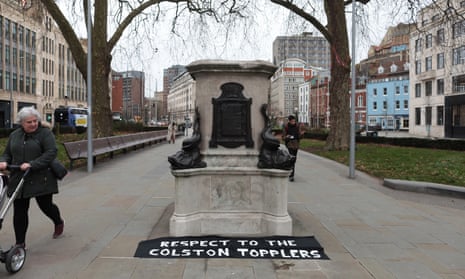Many things were remarkable about the trial of the Colston Four, who last week were found not guilty of criminal damage for pulling down the statue of the 17th-century slave trader Edward Colston and throwing it into Bristol harbour. Among them was the fact that the four defendants were white, as was the judge and, reportedly, most of the jurors. It made me wonder, are white people increasingly recognising the significance of Britain’s legacy of slavery?
In my view, white people in Britain have a special responsibility when it comes to this legacy. After all, the vast majority of those who transported the captured Africans to the Caribbean were white. Similarly, the vast majority of those who “bought” these enslaved people and made them work on the appalling sugar, cotton and coffee plantations were white. The same is true of the shipowners and sailors, bankers and insurance officers, traders, dockworkers, shopkeepers and countless others involved in selling the commodities back in Britain. This includes my own family, who made money importing tobacco from American and Cuban plantations that were worked on by enslaved people. As to the general population who gained from the enormous wealth that poured into Britain on the back of slavery, again the vast majority were white.
Of course, there were some Black and mixed-race people who helped capture the men and women enslaved by the British. Indeed, the presidents of both Benin and Ghana have acknowledged and apologised for their ancestors’ culpability in the slave trade. There were also some Black and mixed-race sailors, traders, plantation owners, even slaveholders. But this was on a minute scale compared to the systematic brutality of the white-controlled Caribbean slave societies.
More than this, it is clear that the legacy of slavery is very much alive in Britain today. And while it is hard to prove a direct link between Britain’s role in slavery and contemporary social conditions, it nevertheless exists.
You can see it in the higher arrest rates for Black British people, the differentials of economic opportunity and health outcomes, the widespread racism. Clearly, other groups experience social and economic hardships in Britain, including members of the white working class, but this does not preclude dealing with the specific challenges facing those of African and Caribbean descent. So while Britain today is an increasingly diverse society, it is still reasonable to say that the white population has an additional responsibility when it comes to the legacy of slavery.
This then is what might be termed “white debt”. A cultural debt, acknowledging and apologising for the horror that was British slavery. A financial debt, compensating for the economic losses endured by those enslaved and the generations of their descendants. And a debt of gratitude, to the enslaved freedom fighters, who not only won liberty for themselves through bravery, courage and organisation, but for everyone, all humanity, including white people.
I am not saying that white people alone have a debt, I am saying that white people have an additional responsibility. In the same way that by affirming Black Lives Matter it does not mean everyone else’s lives don’t matter, but that special attention needs to be paid to Black lives, as they are disproportionately suffering inequality and abuse.
I know a little about reparations: I have received money from the German government because of what the Nazis did to my Jewish family in the 1930s. They kicked my grandmother out of university and stole my family’s house. My family was forced to flee the country. Several relatives were killed in the Holocaust. To be clear, the British slave trade and what Jews endured in Nazi Germany are two separate historical tragedies, and to draw out similarities and differences, or worst of all to judge which crime is greater, would be a mistake. But I believe there may be some lessons to be learned.
Clearly, not everyone agrees with me. When my book came out last week, I was criticised by the rightwing press for “wallowing in guilt”. Of course, going after individuals, rather than talking about white people’s collective responsibility – let alone the legacy of slavery for the descendants of those enslaved – is an effort to distract, minimise and marginalise. It is also not unusual. Midway through the trial of the Colston Four, a presenter on the rightwing news channel GB News proclaimed: “I’m in favour of white people calling out racism … but the Colston saga reeks of white guilt.”
The good news is that conversations around our shared history are increasingly happening. Think of the Black Lives Matter protests. The National Trust report into properties funded by slavery. The University of Glasgow, Bank of England, Lloyds of London and others engaging with their legacies of slavery. Instead of being erased, as Boris Johnson and his associates often claim, our history is being brought into the light, so it can be reexamined and recurated.
We don’t know why the jury in the Colston Four trial made their decision, but they were presented with perfectly lawful reasons to acquit. There does seem to have been a moral dimension to the proceedings. Pulling down the statue was an “expression of my allyship and solidarity with people of colour”, one of the defendants, Rhian Graham, told the court. “By removing that statue we were removing a symbol of great harm and oppression that towered over our community and offended so many.”
Which is why the decision to find the Colston Four not guilty last week gave me hope. For it just perhaps signalled that white people are beginning to really acknowledge Britain’s legacy of slavery. The next question is, what should be done about it?
Thomas Harding is the author of White Debt: the Demerara Uprising and Britain’s Legacy of Slavery
